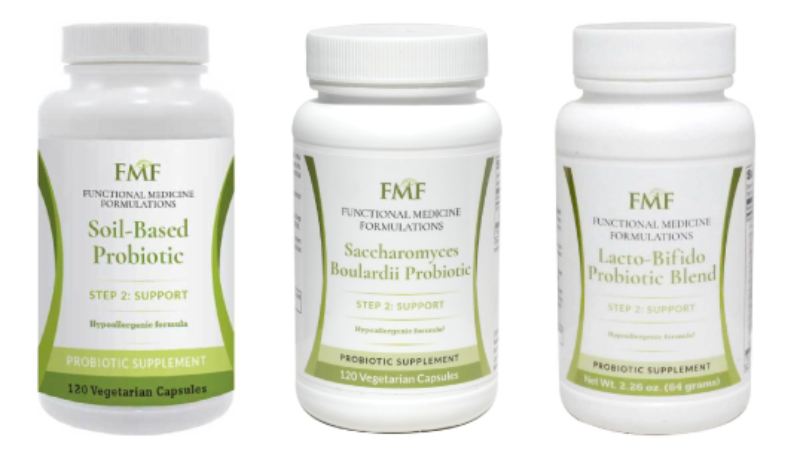How To Treat Anxiety Naturally By Improving Your Gut Health
High-level scientific evidence shows how healing your gut can improve anxiety symptoms.
More and more research is revealing the strong link between brain and gut health. A recent systematic review pulls together evidence that regulating gut microbiota can improve anxiety. 56% of the studies in the review showed that healing the gut through diet (typically the low FODMAP diet) or probiotics led to an improvement in anxiety symptoms. If you’re looking for natural ways to address your anxiety, learn some simple steps you can take right away.
Dr. Michael Ruscio, DC: Hi, this is Dr. Ruscio. Did you know that many cases of anxiety can actually be caused by your gut? Let’s discuss a systematic review that reviewed all of the available, randomized control trials, establishing, thankfully, that treatments for your gut can actually improve your anxiety.
[Continue reading below]
Study: Effects of regulating intestinal microbiota on anxiety symptoms: A systematic review
- This systematic review revealed a 56% response rate in anxiety symptom improvement by regulation of intestinal microbiota through the use of probiotics and diet (namely the low FODMAP diet in many cases)
What you can do?
- Improve your diet
- Omit processed foods, stick to whole and fresh foods only
- If you still need improvement, try the low FODMAP Diet
If there is still room for symptom improvement, use a well-rounded probiotic protocol (www.drruscio.com/probiotics) .
Download this Episode (right click link and ‘Save As’)

Gut Dysbiosis Related to Anxiety
To quote, “More and more basic studies have indicated that gut microbiota can regulate brain function through the gut-brain axis, and dysbiosis of intestinal microbiota was related to anxiety. However, there is no specific evidence to support treatment of anxiety by regulating intestinal microbiota.” Well, I would not agree with that, but this is what they’re trying to rectify.
So, the aim of their study: “To find evidence supporting improvements in anxiety symptoms by regulating intestinal microbiota.” Now, intestinal microbiota is another way of saying the world of bacteria and fungus and other like organisms in your gut.
Let’s continue. “Methods.” This systematic review of randomized control trials looked through 3,334 articles and only 21 were high-quality enough to be included in this analysis, with a total of about 1500 patients over the 21 studies. Here’s where things get really exciting.
Let’s look at the effect of the treatment study. “14 studies chose probiotics as interventions” and “six chose non-probiotic ways”, mostly diet. The diet most often used—although not exclusively—what is known as the low FODMAP diet, a diet that helps to starve bacterial overgrowths, which can be problematic, can cause gut symptoms and inflammation, and through the gut-brain connection, can cause anxiety.

Rather, probiotics, in helping to heal and rebalance the gut, can have a wide array of improvements that they lead to, because they are oftentimes treating the underlying cause, gut imbalances of multiple symptoms. This is how we can see different probiotic formulas show improvements in things like various skin conditions, allergic conditions, neurologic conditions as we’re discussing here like anxiety. There’s also other evidence showing improvements in things like depression, and the ability to fight various bacteria and fungus in the gut and improve symptoms of IBS, gas, bloating, constipation, loose stools, and diarrhea.
Thankfully, regarding the probiotics, again, a specific special probiotic formula was not needed. Various probiotic formulas from single strain all the way up through multiple strain probiotics all showed benefit. What that tells you is you don’t have to be highly prescriptive or specific with the probiotic that you use, and you don’t have to be held hostage necessarily by marketing claims that you must use only this probiotic or that probiotic, in attempts to improve your gut-brain connection and therefore anxiety.
Diet, Probiotics Can Improve Symptoms
Here’s where things get really exciting. And I’ll quote: “56% of studies could improve anxiety symptoms.” 56, over half of the studies, whether they’re using probiotic or diet, most namely the low FODMAP diet, showed the ability to improve anxiety. That is huge. If you look at the outcome of many medical interventions, a 50% response rate is pretty darn good, especially for conditions that can be multifactorial in cause, as anxiety can.

“More studies are needed to clarify this conclusion since we still cannot run meta-analysis so far.” A little bit of caution there. A meta-analysis would mean that there are many like studies that can be summarized, to give a specific numeric score of the efficacy or effectiveness of the treatment. We’re still short of that. However, for those who are looking to an anti-anxiety or antidepressant medication or natural therapies, it certainly seems tenable to start at least with a reasonable trial on diet and probiotics, see if your symptoms improve, and if not, then consider medication.
And I would always do this under the guidance of your doctor and keeping your doctor in the loop. But great news here, that those who are suffering with anxiety have some great natural, nutritional, and supplemental options that have at least some high-level preliminary evidence supporting their effectiveness.
Sponsored Resources

In this line, you will find my favorite three probiotics in all three of the main categories that work synergistically to help you fight dysbiosis, like SIBO, candida yeast, and H. pylori, help to eradicate parasites, help to reduce leaky gut and repair the gut barrier, and can improve gas, bloating, diarrhea, constipation, and may even improve mood, skin, sleep, and thyroid function because of the far-reaching impact of the gut. You can learn more about these at drruscio.com/probiotics.

In a direct side-by-side comparison, and this is really cool, I’ll put a video showing you this, the Platinum LED Therapy Lights produced the highest irradiance of any LED therapy light on the market today.
All of their lights come with a 60-day trial period, which is great, and a full three year warranty worldwide. Also, when positioned correctly, they admitted to zero EMF. They are now offering $50 off select panels when you visit platinumtherapylights.com and use the coupon code Ruscio50.
Practical Tips to Get Started
Now, what can you do? Well, we want to improve the health of your gut or improve the health of your intestinal microbiota. There are really three things I’d recommend here specifically, in light of both my clinical experience and what this study has found. One, improve your diet. You don’t necessarily have to go to the low FODMAP diet right out of the gate. That’s a little bit more of a specialty diet. If you haven’t gotten sodas, sweeteners, sugars, and processed foods out of your diet, of course, start there. Focus on cooking all of your own food and consuming whole, fresh foods. Nothing pre-packaged, nothing processed. Buying meat, vegetables, fruit, fish, eggs. Start there.
If you’re already doing that, then you can go to a trial on the low FODMAP diet. I will put our low FODMAP diet up here on the screen and also link to it. I believe this to be one of the most up-to-date low FODMAP diets available, because we do follow the research literature here closely and update continuously our low FODMAP diet as new evidence becomes available regarding the FODMAP content in various foods.
So, basic dietary changes. If you’re already there, low FODMAP diet. And you only need a couple weeks to start seeing improvements from this diet, if it will work for you. Now, if you’ve given this diet a few weeks and you’re not noticing any movement of your symptoms, any improvement, then you can go on a probiotic protocol.
Again, the probiotics are not highly specific. However, I have found it very effective to try a well-rounded probiotic protocol. Some people will not fully respond to just one probiotic or one strain of probiotic because they need more of a litany of healthy probiotics. That is why I’ve developed the three-category system which ensures that you’ll have one good probiotic formula from the three major categories. I’ve linked you all the information here.
Essentially when we look at the probiotic research, we see that amongst all the hundreds of studies, we can organize most probiotics into one of three categories. You want to try all three of these categories in combination to help give your gut the broadest, healthiest probiotic stimulus possible. This can be the difference between success and failure for some people.
You also want to make sure that you’re using a quality probiotic. Of course, some companies will cut corners and not put very much bacteria in there. They’ll put a lot of filler in there to be able to have a very cheap probiotic, however you’re getting what you pay for. That’s also not to say that the most expensive probiotic is the best. There is a balance here to be struck, and I think we’ve really achieved that in the three-category probiotic protocol that we recommend.
In close, if you have anxiety, fortunately there’s some very high-quality preliminary evidence showing that various treatments for your gut—most namely a low FODMAP diet and probiotics—can be effective and improve your anxiety.
If you are suffering with anxiety, don’t suffer another day. Take some steps to perform these simple interventions that can not only improve your anxiety, but if you, let’s say, have constipation or abdominal pain and anxiety, these dietary changes or probiotics could help with all of those symptoms. When we use natural medicines that treat the cause we oftentimes see side benefits rather than side effects, and you are positioned to reap all the rewards of that.
Again, this is Dr. Ruscio reporting in on a very exciting systematic review on the power of the gut-brain connection and how you can use this to improve your anxiety. I hope this information helps you get healthy and get back to your life.
Dr. Michael Ruscio is a DC, natural health provider, researcher, and clinician. He serves as an Adjunct Professor at the University of Bridgeport and has published numerous papers in scientific journals as well as the book Healthy Gut, Healthy You. He also founded the Ruscio Institute of Functional Health, where he helps patients with a wide range of GI conditions and serves as the Head of Research.Links & References
What do you think? I would like to hear your thoughts or experience with this.
- Get help using this information to become healthier.
- Get your personalized plan for optimizing your gut health with my new book.
- Healthcare providers looking to sharpen their clinical skills, check out the Future of Functional Medicine Review Clinical Newsletter.




Discussion
I care about answering your questions and sharing my knowledge with you. Leave a comment or connect with me on social media asking any health question you may have and I just might incorporate it into our next listener questions podcast episode just for you!